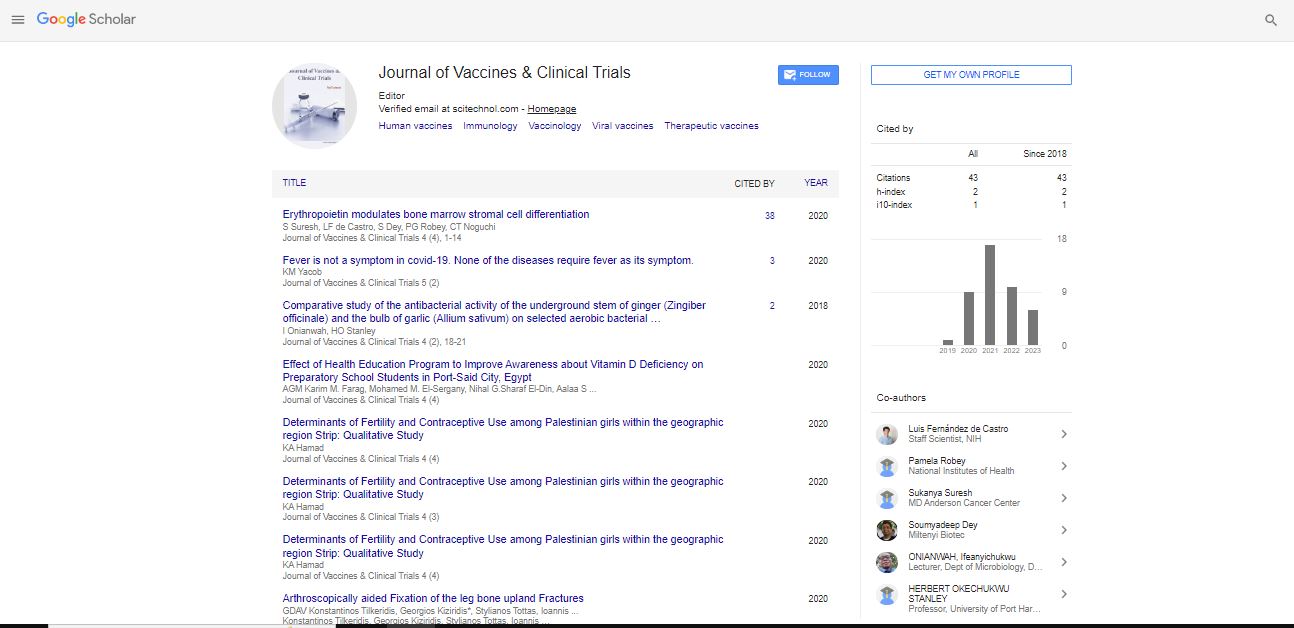Opinion Article, Jou Of Vac Cli Tr Vol: 7 Issue: 1
The Impact of Dengue Virus on Human Health
Georege Kanadie*
1Department of Microbiology, Islamic Azad University, Tehran, Iran
*Corresponding Author: Georege Kanadie
Department of Microbiology, Islamic
Azad University, Tehran, Iran
E-mail: Kanadie159@hotmail.com
Received date: 24 February, 2023, Manuscript No. JVCT-23-92765;
Editor assigned date: 28 February, 2023, PreQC No. JVCT-23-92765(PQ);
Reviewed date: 13 March, 2023, QCNo JVCT-23-92765;
Revised date: 21 March, 2023, Manuscript No. JVCT-23-92765 (R);
Published date: 30 March, 2023, DOI: 10.4172/JVCT.100064.
Citation: Kanadie G (2023) The Impact of Dengue Virus on Human Health. Jou of Vac Cli Tr 7:1.
Description
Dengue is a viral disease that is transmitted by the Aedes mosquito. It is a significant public health issue in tropical and subtropical regions, affecting millions of people each year. Dengue fever is characterized by flu-like symptoms, which can progress to severe dengue, a potentially fatal condition. This manuscript aims to provide a detailed review of the impact of dengue virus on human health. The virus can also be transmitted through blood transfusions or organ transplants. Dengue is not spread directly from person to person. Once a person is infected, the virus replicates in the bloodstream and infects white blood cells, leading to a range of symptoms.
In areas where dengue fever is common, efforts to control mosquito populations are also important. This may involve spraying insecticides, removing standing water, and other measures to reduce the number of mosquitoes that can transmit the virus. When a mosquito bites a person who is infected with the dengue virus, it sucks up the virus along with the blood. The virus then replicates inside the mosquito's gut and eventually spreads to its salivary glands. When the mosquito feeds again, it injects the virus into the new host's bloodstream.
In some cases, the immune response can become more severe and lead to a condition called dengue hemorrhagic fever. This is a rare but potentially life-threatening complication of dengue fever that can cause bleeding, shock, and organ failure. Once inside the body, the dengue virus begins to replicate rapidly. It infects nearby skin cells called keratinocytes, which are found in the outer layer of the skin. The virus uses these cells to replicate and spread to other parts of the body.
Symptoms
The symptoms of dengue fever typically appear within 4-7 days after infection and can last up to 10 days. The most common symptoms include fever, headache, joint and muscle pain, rash, and nausea. Severe dengue can lead to shock, bleeding, and organ damage, and can be fatal if not treated promptly.
Impact on health
Dengue fever can have a significant impact on human health, both in terms of morbidity and mortality. The disease can cause a range of complications, including dehydration, shock, and organ failure. Severe dengue can also result in long-term health effects, including neurological and cognitive impairments.
Treatment and prevention
There is no specific treatment for dengue fever, and most cases are managed with supportive care, including fluids and rest. In severe cases, hospitalization may be required, and patients may need blood transfusions or intravenous fluids. Prevention is the best approach to managing dengue fever. This includes controlling the mosquito population through insecticide spraying and eliminating breeding sites, such as standing water. Vaccines are also being developed, with some already available in certain countries.
As the virus spreads, it triggers an immune response in the body. The immune system recognizes the virus as an invader and launches an attack to eliminate it. This response can cause a variety of symptoms, including fever, headache, muscle and joint pain, and a rash. Rest, fluids, and over-the-counter pain relievers can help relieve fever and pain. In severe cases, hospitalization may be necessary to provide intravenous fluids and other supportive care.
Preventing dengue fever involves taking steps to avoid mosquito bites. This includes wearing protective clothing, using insect repellent and using mosquito nets or screens to keep mosquitoes out of living areas. Eliminating standing water around homes and other areas where mosquitoes breed can also help reduce the risk of infection.
Conclusion
Dengue fever is a significant public health issue, with millions of cases reported each year. The virus can cause a range of symptoms, from mild to severe, and can have long-term health effects. Prevention is the best approach to managing dengue fever, and efforts should be focused on controlling the mosquito population and developing effective vaccines. The dengue virus enters the body through the bite of an infected mosquito. Once inside, it replicates rapidly and triggers an immune response that can cause a range of symptoms. Preventing dengue fever involves taking steps to avoid mosquito bites and controlling mosquito populations in areas where the virus is common.
 Spanish
Spanish  Chinese
Chinese  Russian
Russian  German
German  French
French  Japanese
Japanese  Portuguese
Portuguese  Hindi
Hindi 